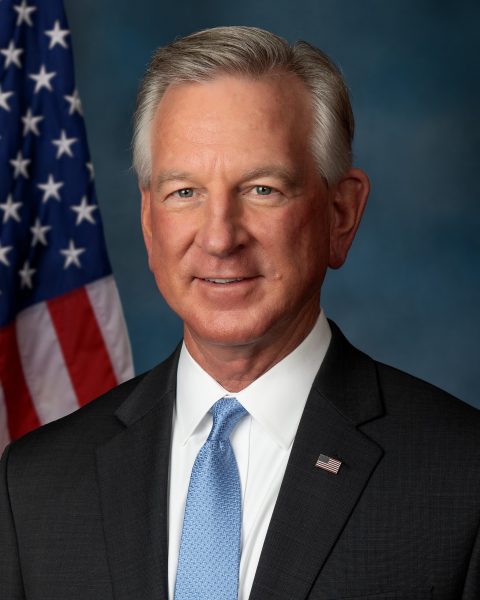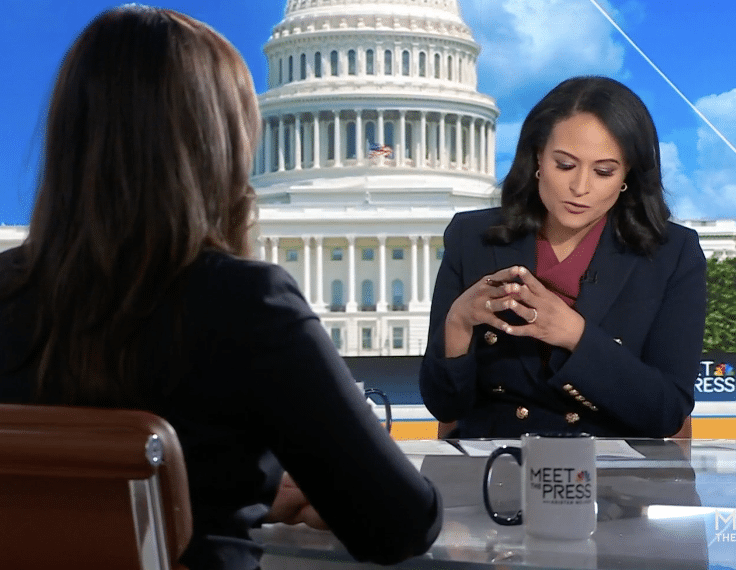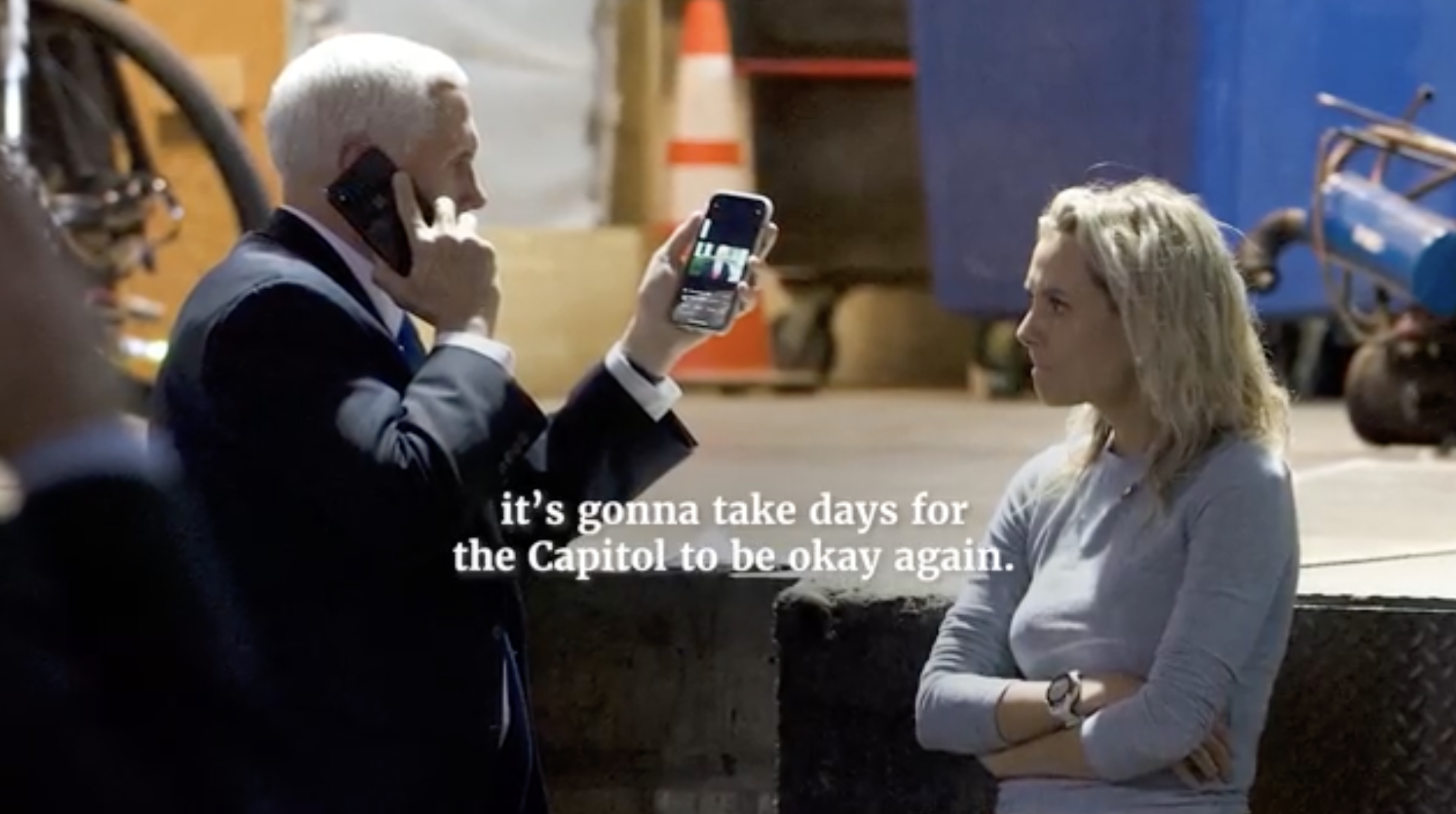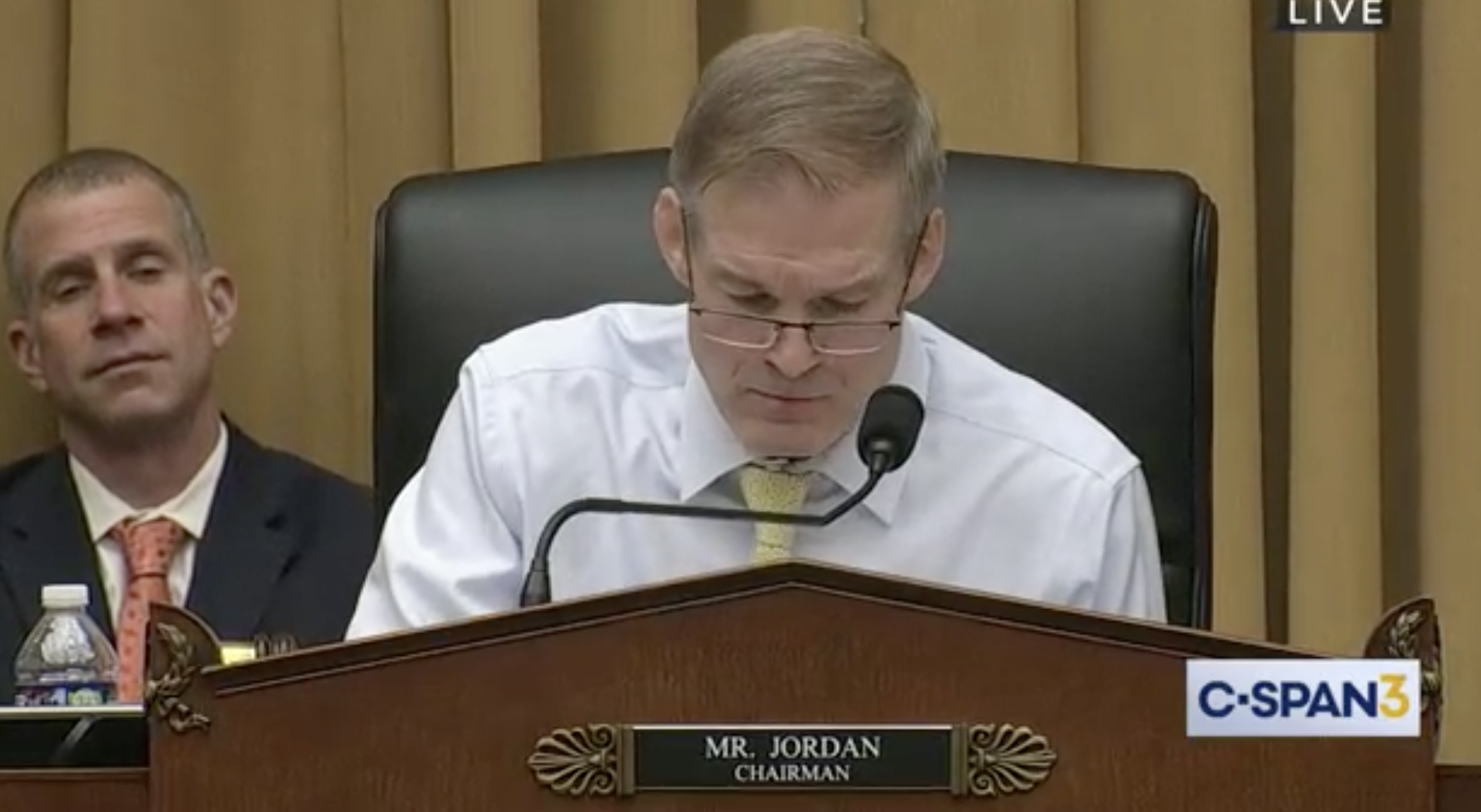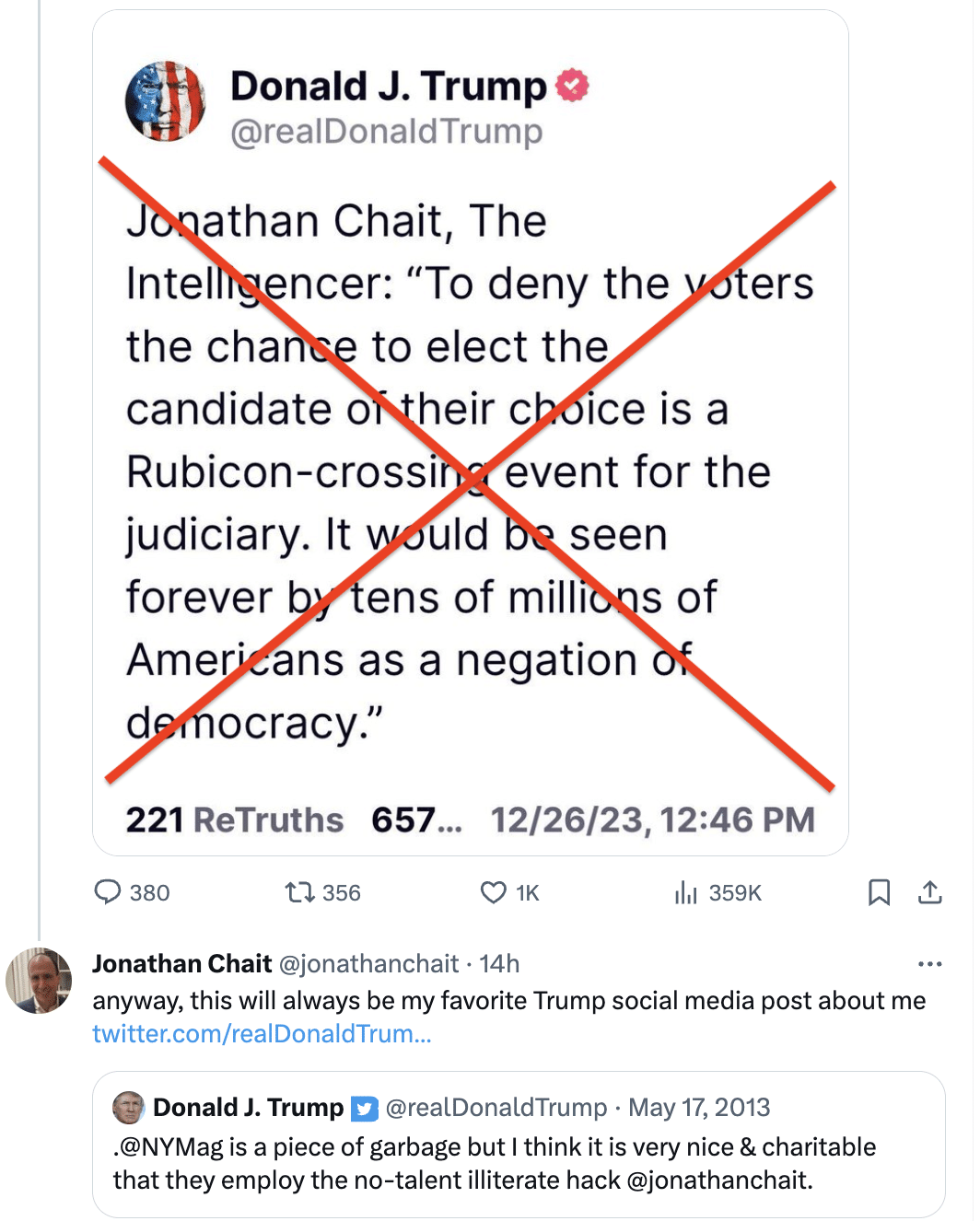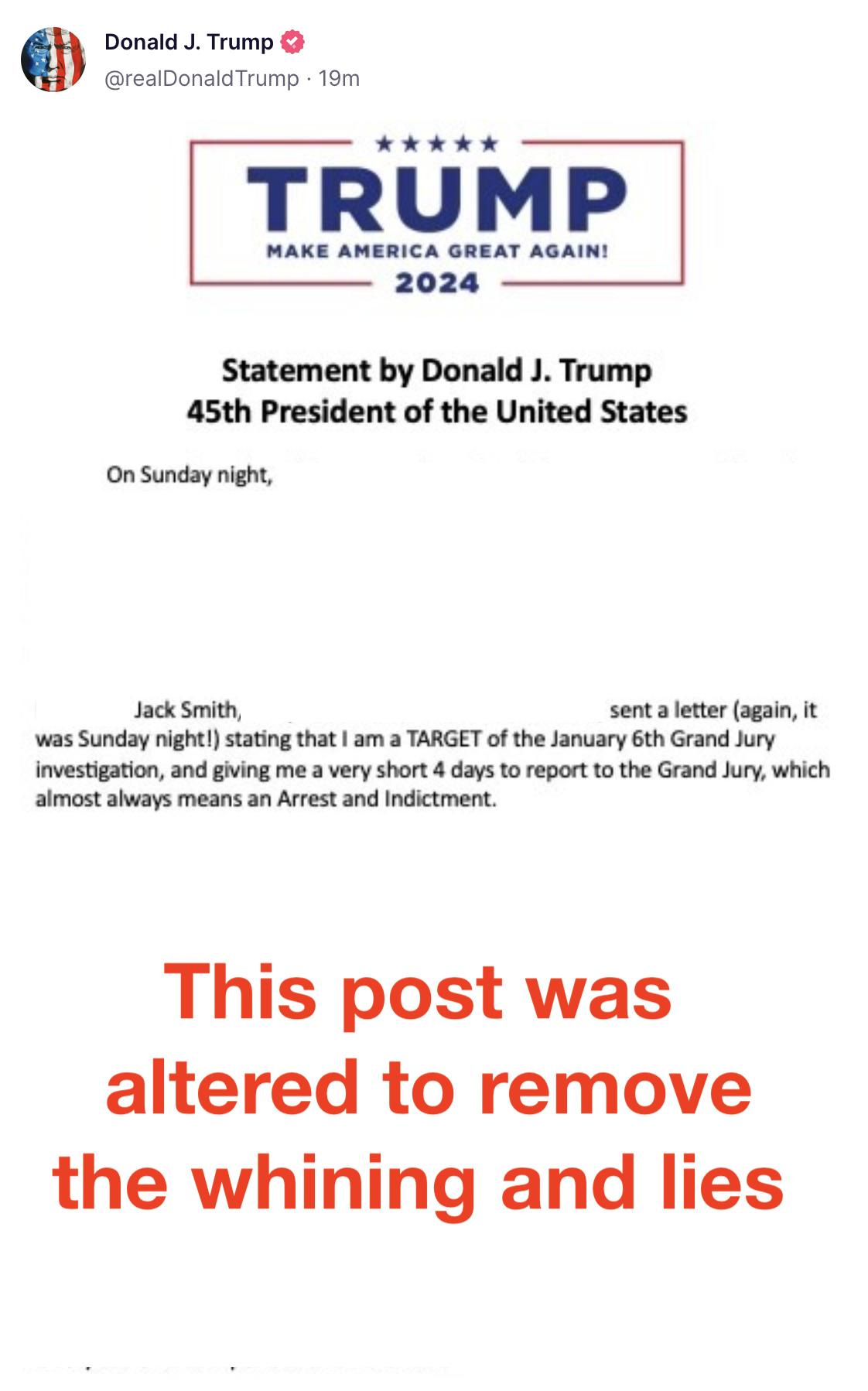I read a column recently by someone who argued that DOJ had failed because Trump and his top deputies are not yet in prison.
It was the expression of someone who always had unrealistic expectations about how long white collar investigations take, even ignoring the delays overtly attributable in this case to Executive Privilege claims (which stretched from June 2022 to April 2023), other privilege fights (9 months for Rudy’s devices, longer for John Eastman’s, and still longer for Scott Perry’s, with a total of 25 witnesses invoking some kind of privilege), and litigation that would be inevitable when prosecuting the first former President (three months so far on the immunity claim).
Where the column made a decent point, though, is in the ethical response to Trump’s prosecution. Normally, if a politician were charged with 91 felonies on top of the several personally damning civil suits and two trials involving your eponymous corporation, it would be sheer insanity for any politician to have anything to do with the scoundrel.
Republicans don’t give a fuck anymore.
And until we can solve that problem, we will always be fighting an uphill battle against fascism, because Republicans simply do not give a shit about rule of law anymore.
As I hope to write up one of these days, Trump has spent the last 8 years training Republicans to loathe rule of law. At first, he trained Republicans to adhere to him over rule of law. Now, opposing rule of law is an explicit litmus test for politicians in the Republican Party, who as a result join Donald Trump as he assaults rule of law at every turn.
Which is important background to Elise Stefanik’s appearance on Meet the Press today. Along with refusing to commit to certifying the election, Elise called those prosecuted for their crimes on January 6 “hostages” (much of the transcript is below).
In context, I don’t think Elise was explicitly comparing the Jan6ers to hostages held by Hamas, as many took her comment to be.
Rather, and perhaps more damning, I believe this was defensiveness. I believe she was, instead, defensively responding to the clip Kristen Welker had shown of Trump adopting the term, a term Trump has adopted from the culture of martyrdom that right wing supporters of terrorism adopted (as right wing terrorists always do) long before October 7. Elise was also defensively responding to a clip Welker showed of Elise herself, condemning the violence that Trump has now embraced.
Before I look at what Elise said, let’s talk about why.
In response to a great post on January 6 and fascism the other day, I attempted to write a taxonomy of the reasons why Republicans are waltzing along with Trump towards fascism. This is evolving, but I came up with:
- Cowards afraid of his retaliation
- People conned by his grift
- Utilitarians who believe he’s the only way GOP wins
- Adherents of fascism
- Christian nationalists
I have no doubt that Elise worries that defending her past statements might elicit retaliation from Trump, item 1. But for her, this is about ambition, utility, item 3.
In a profile that describes friends explaining that Elise wasn’t radicalized to Trump’s radical beliefs, she just sold out to her ambition, Nicholas Confessore described her gradual transformation into one of the most ardent MAGAts. With Elise it’s all about naked ambition, the conviction that by yoking her own destiny to Donald Trump’s she will gain power herself.
But according to current and former friends, she felt increasingly frustrated and lost in the House, horrified by the behavior of her harder-right colleagues and unsure of her place. As Mr. Trump’s presidency unfolded, it was becoming more difficult to play the middle. Some of the high-profile issues on which she had positioned herself as a bipartisan leader — climate action, immigration — had little traction in the Trump era. The president’s base wanted revenge, not high-minded ideas; Mr. Trump set policy by tweet, not white paper. As the 2018 midterms approached, Ms. Stefanik’s campaign took on a grim, joyless air. According to friends and advisers, she seemed brittle and unhappy. No longer a novice candidate, she dictated a hyperlocal campaign, emphasizing her bipartisanship and focus on regional issues. Though Democrats took the House that fall, Ms. Stefanik won the largest margin of any Republican in New York, a seeming validation of her carefully calibrated approach. But it was bittersweet. She was a promising young lawmaker with a seat at no particular table, respected by her party’s fractured establishment but viewed with suspicion by its ascendant Trump wing.
Still, the campaign had given Ms. Stefanik a glimpse of an alternate path. That August, she had appeared with Mr. Trump at Fort Drum, a major military base in her district, to mark the signing of that year’s defense bill. With a Democratic wave approaching, Ms. Stefanik had fretted for weeks over whether and how she wanted him to appear, but ultimately lobbied hard for Mr. Trump’s visit, according to a former White House official involved in the planning. At Fort Drum, Mr. Trump mispronounced her name — calling her “STEF-a-nik,” not for the last time — and offered backhanded praise. “She called me so many times” that he had dodged her calls, Mr. Trump told the audience. Ms. Stefanik gave a brief speech from behind the presidential lectern, lit for television as she cited the bill’s pay increase for soldiers and provisions she had written providing support for military spouses.
The day made a powerful impression, according to people who know or have worked with her. The cheering crowd was “a taste of being Jim Jordan and Mark Meadows for a day,” said the former White House official, referring to two of Mr. Trump’s staunchest House allies. More important, she had successfully maneuvered the power of the presidency — even if it was his presidency — behind a piece of her own agenda. It was a taste of the influence she had always imagined having.
[snip]
Virtually no one who knows her believes she has any genuine attachment to Trump-style populism — unlike Mr. Trump’s earliest supporters, for example, or media figures like the Fox host Tucker Carlson. Indeed, over dozens of interviews, former aides, advisers and friends going back to Ms. Stefanik’s Harvard days struggled to identify any of her deeply held political beliefs at all. Most recalled, instead, her generic loyalty to the Republican Party, her intense competitiveness and her unerring ability to absorb what she thought people around her wanted and to reflect it back at them. Eager to advance, skilled at impressing more powerful figures with her intelligence and work ethic, she has spent years embedding herself wherever the action seems to be at the time.
Today’s appearance was, as everything will be for the next six months, an audition by Elise to be Trump’s running mate.
And that dictated her pitch perfect — from a Trumpian sense — answers to Welker’s questions.
Watch how she did it (I’m paraphrasing the transcript below. Direct quotes are marked. Trump keywords are in pink):
Welker: Do you still stand by your criticism of violence from January 6?
Elise: You cut my defense of “election integrity“! Plus, I also condemned BLM violence. And did you know that [we are claiming without evidence] Joe Biden coordinated with Hunter Biden, who blew off our subpoena, which makes Joe Biden the most corrupt President ever?
Welker: Well, the White House refutes your claim, but Trump lost fair and square. Do you think insurrectionists should be held accountable?
Elise: Hostages! Prisoners! “I believe that we’re seeing the weaponization of the federal government against not just President Trump, but we’re seeing it against conservatives.” Weaponization. Two sets of rules. “If your last name is Clinton or it’s Biden, you get to live by a different set of rules.” Condemn the violence. Election integrity. “if we don’t have [election integrity], we do not have a democracy.” “[T]he real threat to our democracy is these baseless witch hunt investigations and lawsuits against President Trump.” Witch hunt. Tish James. DC Circuit. Undemocratic. Shredding our Constitution. “[Y]ou know who agrees with me, Kristen? The American people. That’s why President Trump is winning in poll after poll against Joe Biden.”
Welker: But DOJ indicted top-name Democrats, including the president’s son, twice
Elise [Interrupts] “[T]he American people are very smart. They know that they tried to give Hunter Biden a sweetheart deal. We’ve heard from multiple IRS blowers” [sic] [sic]
Welker: “He’s been indicted twice, Congresswoman –”
Elise: “A judge that threw out a sweetheart deal that was negotiated on Joe Biden’s behalf. Joe Biden and the Department of Justice have been withheld from going after the Biden crime family, which Joe Biden sits atop of.”
Welker: “Other top Democrats have been indicted, as well. But we have a lot to get to, so I want to stay on track.”
Elise is as good at this kind of word salad filibuster as Jim Jordan, and she cleans up a lot better.
It wasn’t (just) that Elise adopted the word “hostages” for Jan6ers, adopting the term Trump used to turn Jan6ers into martyrs. Much of the rest of her response consisted of blurting the key words she knows Trump wants to see on TV.
This is not meant to be a rational response. Trump is not in the business of fielding rational responses. This was a brilliant performance of Trump’s own degradation of rational response, with many of the required key words included.
Hunter Biden. Dick Pics. Hunter Biden. Dick Pics.
Elise’s response was an overt rejection of rule of law — excuses made for the terrorists who assaulted her work place. It was a defense of Nazis just weeks after her success at accusing liberals of anti-semitism. But it was also a willful rejection of rational argument, in favor of blurting the key words she knows will win her favor from Trump.
It was, most of all, an assault on rationality and truth itself: a refusal to engage in Welker’s futile attempt to get Stefanik to abide by her own words, much less adhere to rational defense of her, much less Trump’s, actions.
I’m not really sure what to do with these exchanges, short of big outlets like Meet the Press refusing to invite insurrectionists. At the very least, people who chant fascist slogans to please Trump need to pay a price. But where? How?
But the press needs to understand that interviews with Trump’s people are not, for him, designed to be a defense of his beliefs — or lack thereof. They are designed to throw out as many key words as possible to blur matters of truth.
Which task Elise performed spectacularly today.
KRISTEN WELKER:
In terms of what we’re hearing today, former President Trump has referred to January 6th as a, quote, “beautiful day.” Just this weekend, he referred to some of those who are serving time for having stormed the Capitol as, quote, “hostages.” Do you still feel as though that day was tragic and that those who were responsible should be held responsible to the fullest extent of the law?
REP. ELISE STEFANIK:
Well, first of all, Kristen, as typical for NBC and the biased media, you played one excerpt of my speech. I stand by my comments that I made on the House floor. I stood up for election integrity, and I challenged and objected to the certification of the state of Pennsylvania because of the unconstitutional overreach. So, I absolutely stand by my floor speech. I am proud to support President Trump. And I want to correct another statement you made that there is no coordination with Joe Biden and the Department of Justice in prosecutions against President Trump. We just saw Hunter Biden defy a congressional subpoena and the White House admitting it was in coordination with Joe Biden the morning of. That is coordination, and I believe that Joe Biden will be found to be the most corrupt president in our nation’s history. And that’s why all of the investigative work that we’re doing is so, so important, because the American people, they deserve transparency and accountability.
KRISTEN WELKER:
A lot to unpack there. Of course, the White House has said that Hunter Biden is acting unilaterally. On the issue of election integrity, though, as you know, Trump took his case to court more than 60 times that there was fraud. He didn’t win. But I want to get back to this key question. Do you still think it was a tragic day? Do you think that the people who stormed the Capitol should be held responsible to the full extent of the law –
REP. ELISE STEFANIK:
I have concerns about the treatment of January 6th hostages. I have concerns – we have a role in Congress of oversight over our treatments of prisoners. And I believe that we’re seeing the weaponization of the federal government against not just President Trump, but we’re seeing it against conservatives. We’re seeing it against Catholics. And that’s one of the reasons why I’m so proud to serve in the Select Committee on the Weaponization of the Government, because the American people want answers. They want transparency. And they understand that, as you look across this country, there seems to be two sets of rules. If your last name is Clinton or it’s Biden, you get to live by a different set of rules than if you’re an everyday, patriotic American. I’ve been clear, Kristen. If you go back and play the full speech I gave on the House floor, I condemn the violence just like I condemned the violence of the BLM riots. But I also, importantly, stood for election integrity and security of our elections, which, if we don’t have that, we do not have a democracy. So, the real threat to our democracy is these baseless witch hunt investigations and lawsuits against President Trump, whether it’s Tish James or whether we see in the DC Circuit Court. And that is undemocratic, and it’s shredding our Constitution. And you know who agrees with me, Kristen? The American people. That’s why President Trump is winning in poll after poll against Joe Biden.
KRISTEN WELKER:
The Justice Department has indicted a number of top-name Democrats, as well, including the president’s son, twice. So, I mean, a lot of critics would argue that undercuts your argument there are two systems of justice.
REP. ELISE STEFANIK:
If you want to try to –
KRISTEN WELKER:
Let me – can I follow up with you –
REP. ELISE STEFANIK:
I want to answer that. If you want to – if you want to make that case, the American people are very smart. They know that they tried to give Hunter Biden a sweetheart deal. We’ve heard from multiple IRS blowers –
KRISTEN WELKER:
He’s been indicted twice, Congresswoman –
REP. ELISE STEFANIK:
But it was because of a judge that threw out a sweetheart deal that was negotiated on Joe Biden’s behalf. Joe Biden and the Department of Justice have been withheld from going after the Biden crime family, which Joe Biden sits atop of.
KRISTEN WELKER:
Other – other – other top Democrats have been indicted, as well. But we have a lot to get to, so I want to stay on track.


